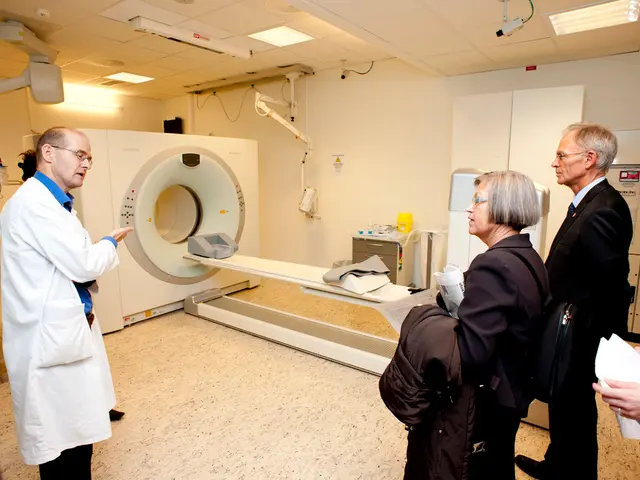Brain's Stealthy Protectors: The Role of Microglia Revealed
Microglia, often referred to as the brain's resident immune cells, play a crucial role in maintaining cognitive functions throughout our lives. These cells influence aspects of learning, memory, and brain resilience, and promoting their health through lifestyle factors such as a balanced diet, regular exercise, and adequate sleep could help preserve cognitive function and delay the onset of age-related cognitive impairments.
A Journey of Discovery
First identified in the central nervous system (CNS) in the late 19th century, microglia were initially understood as phagocytes, responsible for clearing debris and damaged cells. However, advances in histopathology and imaging technology over the past century have revealed that microglia are active participants in CNS homeostasis, inflammation, and neurodegenerative diseases.
Evolution in Understanding
In the latter half of the 20th century and into the early 21st century, research began to uncover the complex roles of microglia. Their activation and proliferation were linked to pathological states such as amyotrophic lateral sclerosis (ALS) and Alzheimer’s disease (AD). For example, in ALS, microglial proliferation correlates with disease progression, demonstrating their dual role in neuroinflammation and neurodegeneration.
Modern Functional Insights
Recent studies have shed light on the sophisticated roles of microglia beyond immune surveillance. They regulate brain blood flow by controlling capillary tone, which affects oxygen and nutrient supply to brain tissue and could relate to vascular abnormalities in neurodevelopmental and neurodegenerative disorders.
Microglia can also "eat" or phagocytose molecular plaques, such as amyloid beta in Alzheimer’s, a process dependent on receptors like ADGRG1. This ability varies with disease severity, influencing cognitive decline.
In response to CNS damage, microglia migrate to the site of injury, becoming activated to manage inflammation and start the healing process. However, an overactive or prolonged microglial response can contribute to neuroinflammation and neurodegeneration.
Advanced transcriptomic studies have revealed microglial heterogeneity and their complex molecular roles in diseases like ALS, highlighting challenges in translating anti-inflammatory therapies from animal models to humans.
Implications in Brain Disorders
Microglia are implicated in various mental health conditions, including depression and schizophrenia, with alterations in microglial function and neuroinflammation linked to the pathophysiology of these disorders. With age, microglia can contribute to increased neuroinflammation, a factor in age-related cognitive decline and diseases like Alzheimer's.
In neurodegenerative diseases like Alzheimer's and Parkinson's, microglia play a dual role, helping clear toxic substances but also exacerbating inflammation and neuronal damage if over-activated.
Therapeutic Potential
Drugs that can modulate microglial activity are being explored as potential therapeutic interventions for brain diseases. Understanding the intricate roles of microglia in health and disease could pave the way for new treatments for various brain disorders, including Alzheimer's and ALS.
In conclusion, microglia have evolved from being seen as passive scavengers to dynamically involved immune regulators within the CNS. Current research focuses on their diverse functions in health and disease, including neurodegeneration, neurovascular regulation, immune response modulation, and their therapeutic targeting to mitigate brain disorders.
- The brain's resident immune cells, microglia, are instrumental in maintaining cognitive functions throughout our lives, influencing aspects such as learning, memory, and brain resilience.
- Research into microglia has expanded significantly over time, revealing their roles in homeostasis, inflammation, and neurodegenerative diseases beyond their initial understanding as phagocytes.
- Microglial activation and proliferation have been linked to pathological states like amyotrophic lateral sclerosis (ALS) and Alzheimer’s disease (AD), demonstrating their dual role in neuroinflammation and neurodegeneration.
- Recent studies have illuminated the sophisticated roles of microglia, such as regulating brain blood flow and "eating" molecular plaques like amyloid beta in Alzheimer’s.
- Excessive or prolonged microglial activity can lead to neuroinflammation and neurodegeneration, contributing to brain disorders and age-related cognitive decline.
- A heterogeneous population of microglia has been identified, with complex molecular roles in diseases like ALS, posing challenges in translating anti-inflammatory therapies from animal models to humans.
- Microglia are implicated in various mental health conditions, including depression and schizophrenia, with alterations in microglial function and neuroinflammation linked to their pathophysiology.
- Drugs that modulate microglial activity are being explored as potential therapies for brain diseases, marking a promising path towards new treatments for conditions like Alzheimer's and ALS.
- As our understanding of microglia and their roles in health and disease deepens, the potential for targeted therapies to mitigate brain disorders continues to grow, aligning with the broader focus on health-and-wellness, mental health, and medical-conditions in modern science.








